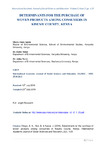| dc.description.abstract | This research was designed to establish the determinants for the purchase of woven products among consumers in Kisumu County, Kenya. By definition, woven products are products made by interlacing fibrous materials like water hyacinth or papyrus reeds alone or incorporated with other materials like bamboo, small round tree stems and branches, used copper wires, iron/ metal rods, and tin cans. These products will restore and protect the environment by reducing pressure on natural forest via reduction in the use of timber solely and also in the amount of solid wastes generated; especially from plastic polythene bags. It will also be of great value to those involved in the cottage industry as a source of employment. The objectives of this study were: to find out the sources and raw materials used to make woven products and the products woven; to find out whether socio-economic status of consumers has an effect on the purchase of woven products; to find out the consumers’ opinion concerning the purchase of woven products and to assess the consumers’ environmental concerns and awareness as they purchase woven products. The study adopted a descriptive research design with a crosssectional social survey. The study area was Kisumu County and the sample areas were two Sub-Counties, namely Kisumu Central (Nyalenda A and Nyalenda B; Dunga) and Kisumu East (Manyatta B); selected using purposive and stratified sampling methods. To gather the required data, a minimum sample of 384 participants was targeted for the study and the three manufacturing and market points within the two Sub-Counties allocated equal sample size (128 respondents). Data collection was through administering structured questionnaires with open ended questions and using interview schedules with the help of two trained research assistants for the qualitative interviews. From the study findings, Lake Victoria was the main source (58%) of weaving materials used; with papyrus reeds (55%) being the major raw material used followed by water hyacinth (24%), sisal (18%) and (3%) Palm tree. Several products were produced from these raw materials; stools were the highest (59%) made, followed by sofa sets (54.5%) and mats (50%). Mats were the most owned product (57%), followed by baskets (39.3%). Consumers’ opinions and knowledge about woven products were significant at 0.0280, 0.0372, 0.0160, 0.0001 and 0.0001 levels that woven products can reduce rate of deforestation, are biodegradable, have ecofriendly life cycle, cheap and not only for low class people respectively. Except for the availability of these products in the market was not significant at 0.8117 hence need for expanding markets for woven products. Social factors; social influence, peer conformity and self image all influenced the purchase of woven products and were all significant at p-value =0.000. Environmental awareness/ knowledge and environmental concern also positively contributed to the purchase of woven product and were significant at p-value= 0.000 and 0.037 respectively. Consumers with environmental knowledge / awareness and concerned about self-image were less (<1) likely to purchase woven products. Therefore, there is need to encourage consumers to utilize their environmental knowledge and awareness towards promoting sustainable development; hence their concern for environment will increase as well. | en_US |

